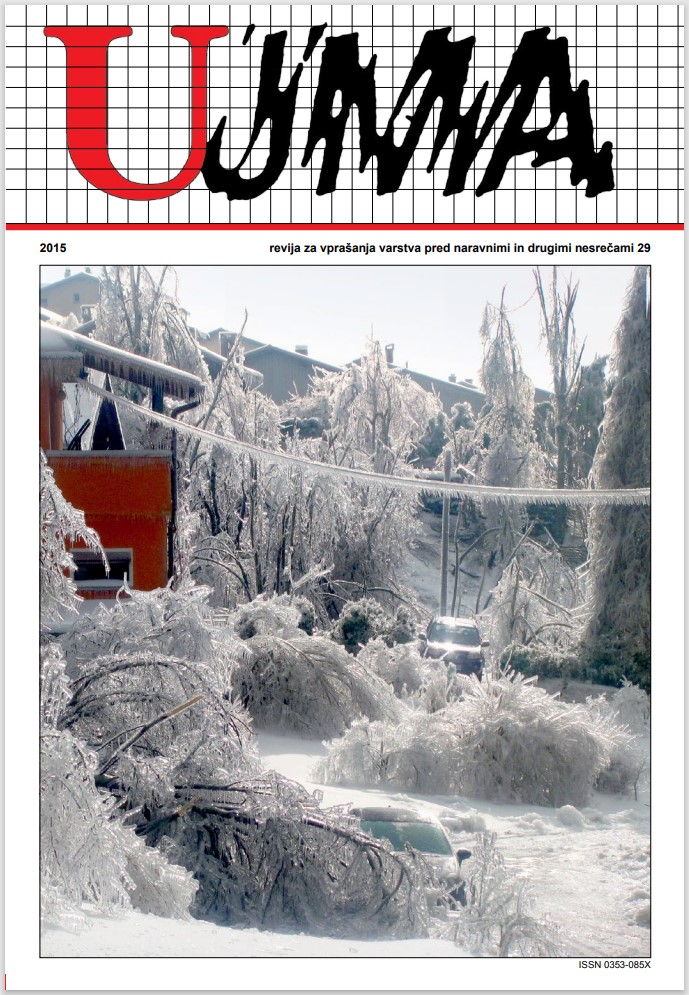RESEARCH AND EDUCATION: AN ESSENTIAL ELEMENT OF NATIONAL INFRASTRUCTURE FOR NUCLEAR SAFETY
Abstract
Slovenia is the smallest nuclear country in the world. It utilizes only one half of the electricity and benefits generated by the Krško nuclear power plant. At the same time, it is fully responsible for the safe operation of this nuclear power plant. At the core of the responsibilities of any nuclear country are the development, maintenance and improvements of the national infrastructure for nuclear safety. Long-term national research program and higher education are among the essential ingredients of the national infrastructure for nuclear safety. Excellence in the operation and maintenance of the nuclear power plant, along with the dwindling and unstable funding of research, might not be sufficient to strengthen the trust of the public in the nuclear safety. Lack of national research might therefore result in the degraded public trust in the safety of nuclear energy. Consolidation and further development of the critical national infrastructure for nuclear safety, including research and education, are therefore of our common and vital interest. It could become one of the focal points of the efforts to manage the climate change with the low carbon sources of the electricity. The burden and responsibility to provide sufficient fresh resources to this purpose remain in the hands of the national authorities, who already committed themselves to this through the ratification of the international conventions and treaties decades ago.
References
Cizelj, L., 2015. Research and Higher Education: A Disposable Part of Fundamental National Infrastructure, International Journal of Contemporary Energy, vol. 1, 5–12.
Convention on Nuclear Safety, 1996. I. A. E. Agency.
Council Directive 2014/87/Euratom of 8 July 2014 amending Directive 2009/71/Euratom establishing a Community framework for the nuclear safety of nuclear installations, E. Council 2014/87/Euratom, 2014.
Edenhofer, O., Pichs-Madruga, R., Sokona, Y., Kadner, S., Minx, J. C., Brunner, S., in drugi, 2014. Mitigation of Climate Change. Contribution of Working Group III to the Fifth Assessment Report of the Intergovernmental Panel on Climate Change. Technical Summary, Cambridge University Press, Cambridge, United Kingdom and New York, NY, USA.
European Commission, 2010. Europeans and Nuclear Safety, Special Eurobarometer 324, Special Eurobarometer 324.
European Commission, 2015. A Framework Strategy for a Resilient Energy Union with a Forward-Looking Climate Change Policy," European Commsion, Brussels COM(2015) 80 final, 25. 2. 2015.
IAEA, 2003. Maintaining knowledge, training and infrastructure for research and development in nuclear safety, International Atomic Energy Agency, Vienna, Austria INSAG-16.
IAEA, 2008. Nuclear safety infrastructure for a national nuclear power programme supported by the IAEA Fundamental Safety Principles, International Atomic Energy Agency, Vienna, Austria INSAG-22.
IAEA, 2014. IAEA Mission Concludes Peer Review of Slovenia's Nuclear Regulatory Framework. https://www.iaea.org/newscenter/pressreleases/iaea-mission-concludes-peer-review-slovenias-nuclear-regulatory-framework 16. 9. 2014.
Kharecha, P. A., and Hansen, J. E., 2013. Prevented mortality and greenhouse gas emissions from historical and projected nuclear power, Environ Sci Technol, vol. 47, 4889–95.
Office for Nuclear Regulation, 2013. Licensee Core and Intelligent Customer Capabilities (Nuclear Safety Technical Assessment Guide), Office for Nuclear Regulation, London, UK NS-TAST-GD-049 Revision 4.
Resolucija o jedrski in sevalni varnosti v Republiki Sloveniji za obdobje 2013–2023 (ReJSV 13–23), 2013.
Stritar, A., 2013. Post-Fukushima Lessons Learned: How to Improve Nuclear Safety through Better Communication between Operators, Regulators, Research and Training, presented at the FISA 2013, 8th European conference on EURATOM researh and training in reactor systems, Vilnius, Lithuania.
The National Diet of Japan, 2012. The official report of the Fukushima nuclear accident independent investigation commission NAIIC (Executive summary).
Train Derailment at Hatfield: A Final Report by the Independent Investigation Board, Office of Rail Regulation. http://www.railwaysarchive.co.uk/documents/HSE_HatfieldFinal2006.pdf2006.
Treaty establishing the European Atomic Energy Community (EURATOM), 1957.
URSJV (2015, 12. 5. 2015). Pooblaščeni izvedenci za jedrsko in sevalno varnost. http://www.ursjv.gov.si/si/info/za_stranke/pooblasceni_izvedenci_za_sevalno_in_jedrsko_varnost/.
Zakon o varstvu pred ionizirajočimi sevanji in jedrski varnosti (ZVISJV-UPB2), Uradni list RS, št. 102, 2004.
Downloads
Published
Issue
Section
License

This work is licensed under a Creative Commons Attribution-NonCommercial-NoDerivatives 4.0 International License.
The articles are made available to the public under Creative Commons Attribution-NonCommercial-NoDerivatives 4.0 International (CC BY-NC-ND 4.0).


